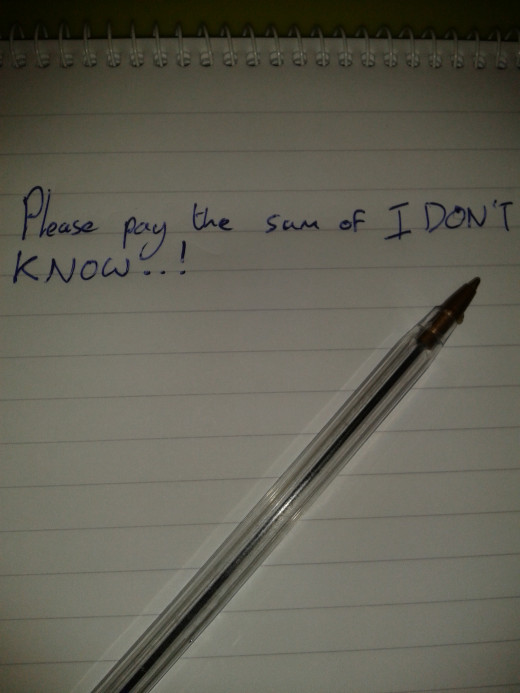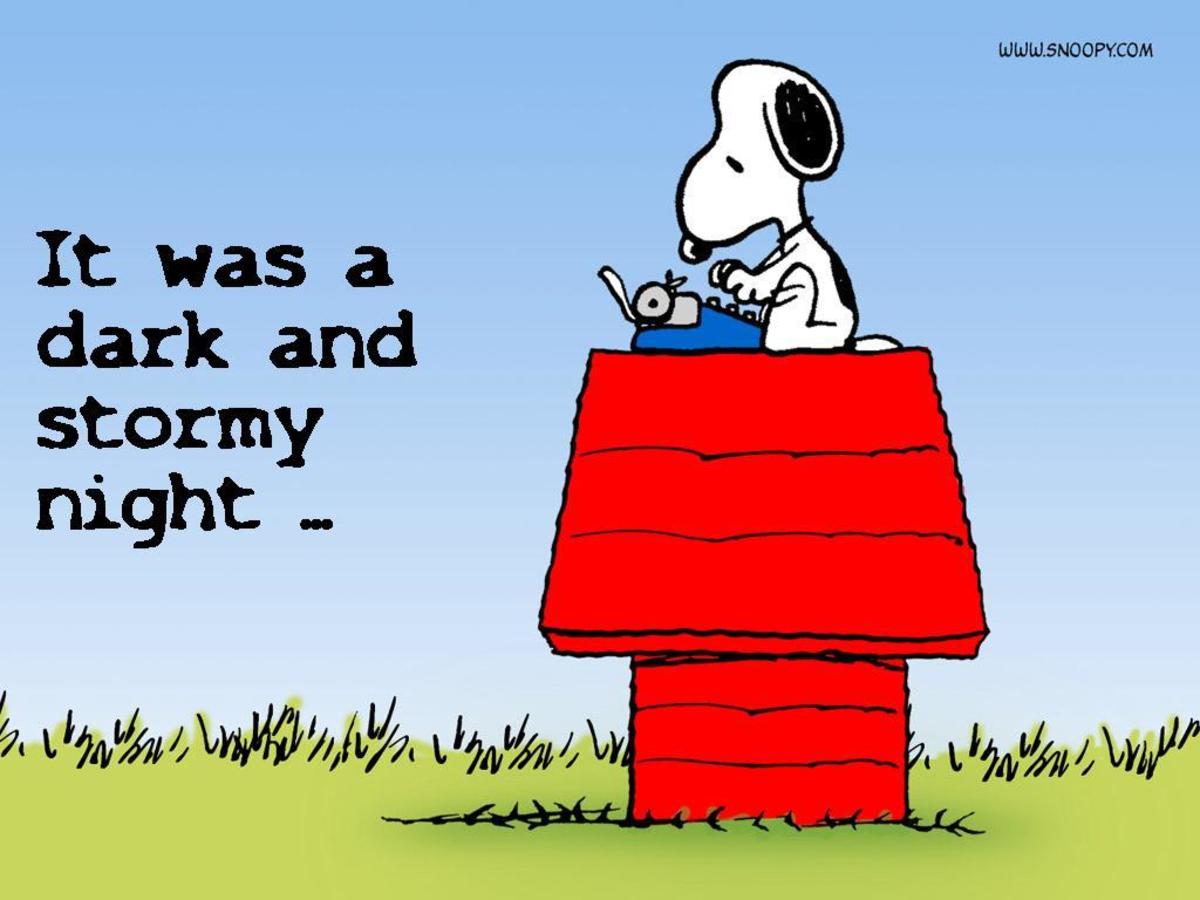Freelance Writing: How much should a writer charge?

Why choosing a price is so difficult
Writers have a way with words - not numbers.
When you first decide to set out on your journey as a freelance writer, it's not the first thing that comes to mind. However, it's usually the first problem to rear its ugly head. Why?
Because writers find it very difficult to price their services.
Ever asked yourself the following questions?
- Should I charge per word?
- How much will anybody be willing to pay for writing?
- Surely words can't be a high-cost commodity?
Many other questions go with this, and throughout this article I intend to highlight a few points which will not only answer this question, but help you to set a price for your services and stick to it.
Looking for a professional freelance copywriter?
- Home | Write Your Wrongs
Write Your Wrongs - home of professional writing services for both business and pleasure. If you can build it with words, you can buy it here.
Freelance writing: What an article is worth
There is a lot of variety when it comes to freelance writing. Different writers write different things for different people:
- Copywriters will generally write sales material for businesses
- Bloggers will generally write regular articles or an active online journal
- CV/Resume writers are known for their ability to help people gain employment
- Creative writers and ghost writers assist folk in writing their works of fiction and non-fiction for publication
- Medical writers will write articles which cover topics which require knowledge in the medical field
The list goes on. What I intend to do here is give an overview of some of the main types of writing and give you an idea as to what people are actually willing to pay.
This overview should not be used as a framework for deciding what to charge - we'll cover that in more detail later.
This outline is mainly intended just to give you a rough idea as to what people will pay for certain types of service, and you'll quickly begin to notice that there is a huge range.
Articles and blog posts
Generally this type of writing is used for either building an active base of followers or for improving a company's SEO efforts.Because blogs and articles are types of writing which businesses who use them need to continue posting, publishing and updating this is perhaps the most frequent type of work you'll come across particularly if you're writing for the web.
This also means that it's one of the lower paid parts of freelance writing.
Depending on what quality is being searched for, the price of an article or a blog post can be incredibly low or surprisingly high.
On the lower end of the scale, if the company isn't too interested in the quality, level of interest generated by the content or avoiding repetition, then there are 'writers' out there who will churn out a vast quantity of low quality articles for as low as $3 each. At this price, there are two outcomes:
- The quality of the writing will be peppered with grammatical errors, spelling mistakes and repetition. The writing will also be vague, general and uninteresting.
- The writer will have severely sold his or her services incredibly short.
Regardless of whether you are just getting started or have been writing a long time, you should never charge such a low sum for your writing. If you are genuinely good with words and have the ability to weave intricate and well researched tapestries with your words, then by charging a fee as low as this you are diluting the writing market.
Even if you're just trying to build a reputation from the ground up and feel the only way to attract new customers and get yourself started is by selling your soul, this isn't the right way to go. Other writers and clients will not respect you if you value your services so low, and you will not go very far.
It's not all doom and gloom though - if you know how to market your skills, value your talent and find the type of clients who are more interested in buying quality than quantity, then you'll find many people are willing to pay a whole heap more than this for your skills.
For a 500 word article, payment can range from between $10 to $75 each depending on what the article is being used for.
Executive summaries, white papers and grant requests
These might sound foreign, but are just posh ways of naming regular types of writing. For example, an executive summary is just a sales letter - but generally it is called an executive summary if the product being sold is targeted for businesses and is usually called so when trying to sell a business, business model or an idea.
What all of these three types of writing have in common however is that generally they are needed by higher paying clientele and as such can be a real gold mine - if you get it right.
The rewards of writing for a higher paying client are balanced with the pressures of writing good quality.
An expertly written, high quality white paper could cost a business anything from $30 to $300+.
Remember - don't get hung up with price. We'll come on to that later.
Resumes, CVs and Cover letters
Because you will find many kinds of budget looking for a professional CV writer - from poor lowly students looking for a place in university, to successful corporate players looking to reach the next rung on the ladder. Because of this, it is often important to aim your services towards a certain type of individual.
A regular CV for a person looking to get a place in a school or their first job may only be willing to pay between $25-$75. On the other hand, somebody high up the corporate ladder who needs to represent themselves professionally in order to make their next million may be willing to pay up to $600.
There are an awful lot more types of writing, each which has their own merits and disadvantages when it comes to pricing. To talk about the specific price ranges of each would take far more space than I have available. However, the important thing to remember is this:
- It is important not to get hung up on an 'amount per page' or to fall in to the mentality of charging a certain amount for a certain type of job. The important thing is developing a pricing structure and sticking to it religiously.
In the next section we are going to look at different ways you can price your services.
Freelance Writing: Different Pricing Methods
The first thing you've got to do when trying to work out how much to charge a client is to develop a pricing structure. It's important that once you've worked out a pricing structure to stick to it. I've written a small section on this already in another article, feel free to check it out if you want the condensed version. For the purposes of this article however we'll be looking a little more in detail.
There are three different mainstream ways to charge a client.
Each has its pros and cons.
Charging by the word
This is perhaps the easiest way of pricing a job up, but it is certainly not the best. That doesn't mean you shouldn't use this model, but make sure you read this report on charging by the word before making your decision.
What is charging by the word?
Charging by the word involves setting a price per word, finding out how many words the client would like writing and then multiplying this by your per-word rate to set the cost for the job. For example, if your per-word rate is 3.5 cents and you have a 500 word article to write, you would be charging $17.50 for the end result. It is important to work out with your client beforehand whether or not your price includes revisions.
Benefits of charging by the word
The most easy to identify plus point about charging by the word is that jobs are easy to price up. You don't have to worry about working out how much a job is worth, because it's just a simple mathematical equation.
Negatives of charging by the word
This is the most important thing to remember (and I've said it on many occasions): Wordcount is not an accurate measure as to how long a job will take you.
In the past, I have managed to churn out 2000 words in an hour for blog posts regarding a subject I know a lot about. However, there are times when I have spent 3 hours straining over a single 500 word article which has required in-depth research and a meticulous approach to detail.
- Different kinds of writing take different lengths of time
- Charging by the word means regardless of how long a job will take you, you receive the same remuneration
How much should I charge per word?
There are writers who offer prices as low as 1 cent per word. More proficient writers can request up to 15 cents per word.
Charging by the hour
The question of "should a writer charge by the hour" is frequently asked. An hourly rate is perhaps one of the better ways to charge for your services, because you can ensure that you are receiving a fair rate for the work you are doing and have a lot more control over your earnings. However, there are pros and cons to this as well.
Positives of charging by the hour
Because you can easily work out how much you need to live on and how much you want to earn, an hourly rate gives you a much better way of ensuring you meet your goals. If a project takes longer than you first thought then you are still assured an hourly payment.
Negatives of charging by the hour
If you work in a remote location then charging by the hour can become difficult if there are trust issues:
- How can your client be sure they are paying only for working hours?
- How can you be sure your client will pay your hourly rate if it takes longer than you anticipated?
Luckily, there are ways to get around this and successfully run a freelance writing business whilst charging by the hour.
How to charge by the hour
OK, so once you have determined your hourly rate (which we will discuss further down in the article), the best way to successfully charge your clients by the hour is as follows:
- Analyse the job. Work out what needs to be done, how much research is required, how fast you can type etc
- Submit this figure to the client. So if you guess a job is going to take 4.5 hours and you are charging £27.50 per hour for example, explain to your client that your estimated time for completion is 4.5 hours and therefore the estimated cost for the job is £123.75
- Once approved, begin the work and submit regular updates along the way.
The purpose of keeping your client updated, is because part way through the job you may find the final completion is going to be faster/slower than you originally thought. If you think a job will take you 4.5 hours and it takes you 10, your client isn't going to be happy receiving a bill for £275.
By letting your client know of any expected changes regularly throughout the work, you are ensuring no nasty surprises and you can also make sure your client is happy for you to carry on.
You don't want to end up working for free: Make sure that if your work time is going to be longer, get your client's permission to continue before you do the work.
Remember as well to let your client know of any specifics.
For Example: The initial drafts will take around 12 hours to complete. Any further revisions you require after this will be chargeable at my hourly rate and are to be discussed as a separate job.
Charging by the day
This method of charging is most beneficial for writers who have a small selection of clients for whom they complete large projects.
What is charging by the day?
Charging by the day is just a larger scale version of charging by the hour. Charging by the hour requires the chargeable units to be set by the hour. Charging by the day requires the chargeable units to be set by the day.
It is important to establish with your client exactly what constitutes a day - does that mean 6 hours? 10 hours?
Negatives of charging by the day
Charging by the day doesn't work too well if the jobs are only small. It also doesn't work too well if you are far away from the client as they have no way of knowing whether you are actually concentrating solely on their project alone.
Positives of charging by the day
You don't need to worry about clocking hours, counting words - you can simply place your whole focus on the job in hand, knowing that for your days work you are going to be getting a set fee.
How to charge by the day
You are going to need to make sure one of the following is adhered to in order to successfully charge by the day:
- You are working in the same location as your client
- You have a constant open channel of communication with your client
- You have a deep level of trust with your client
This is because if a client is paying your day rate - whether that's £50 or £500 - they are going to want to be sure that they are actually getting your day's services.
Like with hourly rate, it is often wise to offer an estimate as to how many days the project will take you.
However, often a client may wish to hire your services indefinitely, which is where this method of charging is most effective. You can place yourself at their beck and call until they no longer wish to pay you, during which time you don't have to worry about what work you are given and how to estimate time scales, because as long as you are following your client's instruction you are receiving your desired daily rate.
The all important question: "How Much Should I Charge?"
OK, so I guess this is the part of the article you're wanting to read the most: How to decide what to charge your clients.
Naturally, your price should reflect your skill and as such, if you are a competent and effective writer who knows the industry well, you are able to demand a high price point.
Factors which contribute to charging a higher price
Some writers are just that: Writers. Some writers are more than that. If you can offer more than just a way with words, you can justifiably charge a higher rate. The following are skills which could allow you to charge more for your services:
- Qualifications. Having qualifications doesn't necessarily mean you are a better writer, but they prove to the client that you're more than just hot air.
- Specialist niches. Are there any topics in existence which you feel you are an absolute expert in? If so, you can charge more if a client is looking for somebody who is not only a writer, but a specialist in that particular field. For example, if you are a qualified dietitian you may be able to charge more than somebody else who isn't when it comes to writing a report on a particular diet plan.
- Proven track record. Having a proven track record doesn't necessarily warrant you charging extra as it doesn't mean you have extra skill, but it does inspire confidence in buyers.
Working out your price
First things first, work out how much you want to earn. Realistically that is - everybody would like to earn a few million.
So let's take for example the figure of $30,000 per year. A fairly standard wage.
You must then divide your annual goal by the amount of hours you realistically expect to be working.
Of course you aren't going to be writing non-stop for 8 hours a day, because with freelancing comes the task of actually finding work. So you need to work out how much work you expect to get (if you're just starting out you might want to read about getting writing jobs with no experience).
Hourly
Let's say for arguments sake that you intend on working 5 days a week, and in each day you'll spend 4 hours actually working. This brings your hourly rate over the course of the year (accounting for 2 weeks of holiday) to $30.
Daily
Similar to the above, you need to work out how many days you think you'll be working. Let's say that out of a full week you intend to find work enough to fill 3 full days. Accounting once more for 2 weeks holiday, your daily rate here would be $200
Per Word
This does get tricky, but as a general rule you have to work out how much your ideal hourly rate is and then decide how long on average it takes for you to create a certain size article. So if it takes you half an hour to write a 300 word article and you'd like an hourly rate of $30, then your per-word rate would be 5 cents.
Of course, these are just examples.
The most important thing is setting yourself a realistic goal, breaking it down into achievable amounts and then sticking to it like glue. Writers who fluctuate their rates to either win work or to exploit gullible clients don't generally last very long. Sure, by sticking to your guns you might find some weeks you're making $200 whereas other weeks you're making $1000. But the longer you stick at it, the more trust you'll build and the more regular work you'll gain, and here's a secret: Clients prefer to work with somebody consistent.
Also, a good tip is to make sure that the figure you have worked out seems to fit with what you're offering: Maybe you've worked out that you are going to be working 1 hour a week and want to achieve $50,000 per year. Charging $1,000 an hour isn't going to happen!









